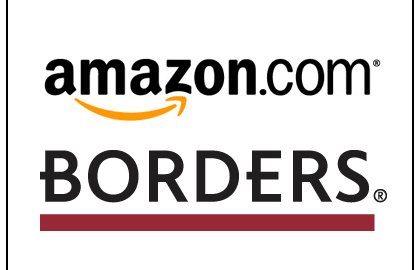Thanks to Amazon, a World Without Borders

So Borders is gone for good, its last four hundred stores scheduled to vanish within weeks. As mourners rush to the liquidation sales, it’s worth pausing to ask: what the hell happened here?
For a handy explanation of the primary answer, I recommend this article. Essentially, thanks to a moldering 1992 law, Amazon can waive sales taxes on purchases while brick-and-mortar stores can’t. Other factors—the convenience of the online shopping model, the success of the Kindle—give the company a competitive advantage over those stores, but the tax gap gives it the power to crush them.
Needless to say, Amazon is fighting to defend this perk, both in the courtroom and on the ballot. Whether they win or lose, physical bookstores are running out of time. The book world now dangles from the pinky of Jeff Bezos, a man who disdains the print book as an ugly technology.
Watching Bezos in interviews, I see a technophile, a guru, a salesman; I don’t see a reader. It’s said that he built his company around books not because he loves or even likes them, but because their ISBNs (International Standard Book Numbers) made them easy to organize as data. His impact on our culture has been, in one sense, accidental; in another, increasingly calculated and aggressive.
I don’t have the heart to deliver a full-blown screed against Amazon; they’ve provided too much convenience and innovation over the years to inspire unmixed anger. What I really want is for the company to curb itself—or be curbed—not suffer some bleak fate of its own. As for Borders, there was a time when it, along with Barnes & Noble, was viewed as the bully of the industry, pushing around publishers and driving independent bookstores to extinction. The king of the hill usually fights dirty to keep his place, and while Amazon’s current advantage may be unfair, I have to admit it’s not technically illegal.
Still, I plan to switch as much of my business as possible to B&N and the independent stores, until and unless the playing field is leveled. My loyalty as a consumer is to the book, not to Amazon’s user experience—or its self-serving vision of the book’s future.
In the meantime, I’ll be sparing a thought for the Borders stores (two in particular, in New York) where I spent many cozy hours with friends (one in particular). For me, bookstores are the very best of the clean, well-lighted places a community has to offer. They’re a kind of spiritual retreat amidst the giant American mall; Jerry Seinfeld called them “one of the only pieces of evidence we have that people are still thinking.” If they die out, the culture of our cities might become Amazon’s culture writ large: an endless sales pitch with no space for reflection.





